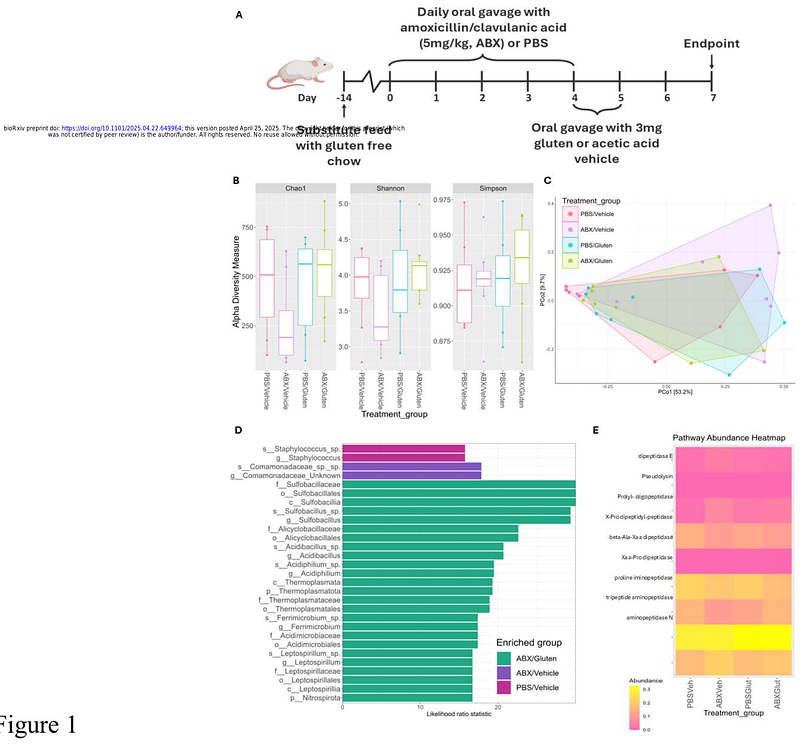Microbiota Modulation Induces Elevated Duodenal Eosinophils Upon Gluten Exposure in Mice: Implications for Non-Coeliac Gluten Sensitivity

Microbiota Modulation Induces Elevated Duodenal Eosinophils Upon Gluten Exposure in Mice: Implications for Non-Coeliac Gluten Sensitivity
Pryor, J. C.; Hoedt, E. C.; Soh, W. S.; Fowler, S.; Caban, S.; Minahan, K.; Sherwin, S.; Nieva, C.; McCarthy, H.; Horvat, J.; Hedley, K. E.; Duncanson, K.; Talley, N. J.; Burns, G. L.; Keely, S.
AbstractA growing proportion of the non-celiac population experience adverse symptoms to gluten. The pathogenesis of non-coeliac gluten sensitivity (NCGS) is unclear, but elevated duodenal eosinophils and altered mucosa-associated microbiota (MAM) populations have been reported. Given the microbiomes role in gluten digestion and its susceptibility to antibiotics, we hypothesised that altering the microbiome with antibiotics would modify immune responses to gluten in mice. BALB/C mice consuming gluten-free chow received amoxicillin/clavulanate (5mg/kg) or PBS-vehicle daily for 5 days. Mice were then treated with a 3mg wheat-gluten suspension, or vehicle, on days 4 and 5 before sacrifice on day 7. Duodenal immune cells were analysed by histology and flow cytometry, while the duodenal MAM and faecal microbiome were characterised via 16S rRNA and shotgun metagenomic sequencing, respectively. Antibiotic treatment followed by gluten reintroduction significantly reduced Staphylococcus in the duodenal MAM, enriched Bacteroides in faeces, and resulted in altered microbial carbohydrate and lipid metabolism, compared to vehicle controls. Treatment with antibiotics and gluten also increased duodenal eosinophils which positively correlated with the genus Blautia. Flow cytometry revealed that antibiotics and gluten treatment resulted in a greater proportion of active eosinophils and epithelial {gamma}{delta} T-cells, compared to vehicle control mice. This study demonstrated that modulating the microbiome with antibiotics was sufficient to alter the immune response to gluten in mice. These findings suggest that the microbiome may determine the capacity for gluten to induce an immune response and offers a valuable insight into potential mechanisms underlying NCGS.\n\nNew & NoteworthyA mouse model examined how microbial modulation affects immune responses to gluten. Antibiotic treatment followed by gluten reintroduction reduced duodenal Staphylococcus and altered microbial carbohydrate and lipid metabolism pathways in the faecal microbiome. Antibiotics and gluten treatment resulted in increased abundance and activation of duodenal eosinophils, and elevated {gamma}{delta} T-cells in the duodenal epithelium. These findings highlight the role the microbiome plays in gluten-induced immune responses, providing insights into mechanisms behind non-coeliac gluten sensitivity.